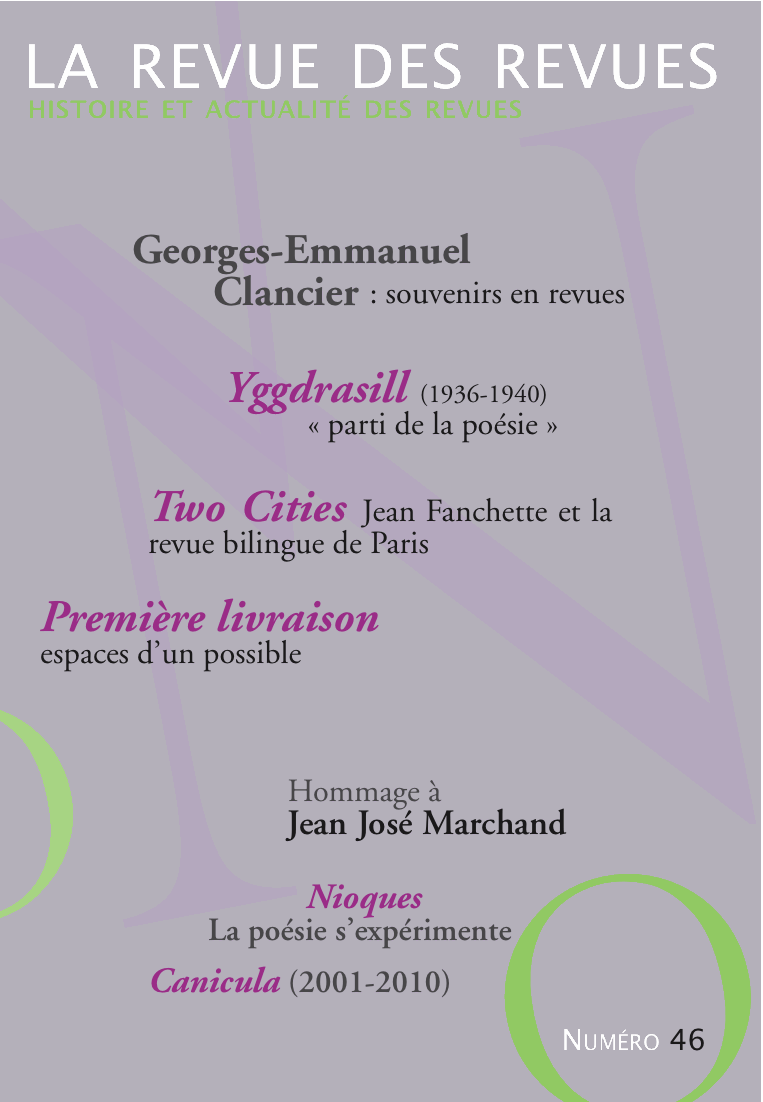par Guillaume Louet
2011, in La Revue des revues no 46
 Yggdrasill fut une revue mensuelle de poésie qui publia un nombre considérable d’auteurs étrangers – Essenine, Lagerkvist, Bialik etc. – et des poètes français irréductibles à d’étroits canons poétiques, tels qu’Armand Robin, Marie Noël ou André Druelle. Ni « absolument moderne », ni traditionnaliste, Yggdrasill proposa des sommaires très riches « sans distinction d’écoles ni de pays », exempts d’esprit doctrinaire. Ses directeurs, Guy Lavaud et Raymond Schwab, eux-mêmes poètes, s’entourèrent des meilleurs connaisseurs de la littérature mondiale, de savants traducteurs, pour donner à lire des études exigeantes et des poèmes souvent inédits. Sa part dans la découverte de poésies du monde entier est ainsi considérable et, à première vue, plus frappante que la manière dont elle représenta la poésie française. Cependant, la revue était, dans le paysage national, remarquable par la très large place accordée aux femmes, une remise en question simultanée de la poésie pure incarnée par l’esthétique valéryenne – quoique Valéry soit un de ses compagnons de route – et du surréalisme, contrebalancée par l’exploration de territoires secrets mais actuels. Yggdrasill se présentait comme « le parti de la poésie » ; elle fut un haut lieu de pensée du « premier explosif du monde » : la poésie.
Yggdrasill fut une revue mensuelle de poésie qui publia un nombre considérable d’auteurs étrangers – Essenine, Lagerkvist, Bialik etc. – et des poètes français irréductibles à d’étroits canons poétiques, tels qu’Armand Robin, Marie Noël ou André Druelle. Ni « absolument moderne », ni traditionnaliste, Yggdrasill proposa des sommaires très riches « sans distinction d’écoles ni de pays », exempts d’esprit doctrinaire. Ses directeurs, Guy Lavaud et Raymond Schwab, eux-mêmes poètes, s’entourèrent des meilleurs connaisseurs de la littérature mondiale, de savants traducteurs, pour donner à lire des études exigeantes et des poèmes souvent inédits. Sa part dans la découverte de poésies du monde entier est ainsi considérable et, à première vue, plus frappante que la manière dont elle représenta la poésie française. Cependant, la revue était, dans le paysage national, remarquable par la très large place accordée aux femmes, une remise en question simultanée de la poésie pure incarnée par l’esthétique valéryenne – quoique Valéry soit un de ses compagnons de route – et du surréalisme, contrebalancée par l’exploration de territoires secrets mais actuels. Yggdrasill se présentait comme « le parti de la poésie » ; elle fut un haut lieu de pensée du « premier explosif du monde » : la poésie.
Yggdrasill monthly literary review brought out a great deal of foreign writers – such as Essenine, Lagerkvist, Bialick to only quote a few – as well as a significant amount of the French poets who were totally devoted to hard-chore poetical models, namely Armand Robin, Marie Noël or André Druelle. Neither completely modern nor traditionalist, the review displayed a great wealth of works without the faintest tinge of pompous doctrine or without any distinction being made between countries or schools of thinking. Not only did its directors and poets – Guy Lavaud and Raymond Schwab – surround themselves with the greatest connoisseurs of worldwide literature but also with the most well-read translators in order to release both demanding and enlightening studies and hitherto unpublished poems. At first sight, the part they played in the discovery of poetry pieces from all around the world seems to be far more striking than the way it embodied French poetry. And yet, in its own country, the review was all the more remarkable for the large place it carved out for women, the way it kept on simultaneously questioning and offsetting the concept of pure poetry epitomized by Paul Valéry’s aesthetics, despite his being a fellow traveler, and surrealism while exploring secret yet topical literary territories. Yggdrasill was meant to be regarded as the Party of Poetry. As such, it became a high scene of – what is known as the first bomb in history – Poetry.